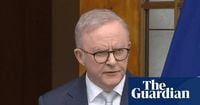In a dramatic escalation of diplomatic tensions, Australia has expelled Iran’s ambassador and suspended operations at its embassy in Tehran, after intelligence agencies linked the Iranian government to a string of antisemitic attacks on Australian soil. The move, announced by Prime Minister Anthony Albanese on August 26, 2025, marks the first time since World War II that Australia has taken such a step, underscoring the gravity of the allegations and the depth of Canberra’s response.
The catalyst for this rupture was an investigation by the Australian Security Intelligence Organization (ASIO) and the Australian Federal Police, which concluded that Iran’s Islamic Revolutionary Guard Corps (IRGC) orchestrated at least two arson attacks targeting Jewish institutions. According to China Daily and corroborated by the Daily Caller News Foundation, the attacks included the firebombing of Lewis’ Continental Kitchen, a kosher restaurant in Sydney, on October 20, 2024, and the torching of the Adass Israel Synagogue in Melbourne on December 6, 2024. Both incidents rattled Australia’s Jewish community, which has faced a surge in antisemitic threats and violence since the outbreak of the Gaza war in October 2023.
"These were extraordinary and dangerous acts of aggression orchestrated by a foreign nation on Australian soil. This is an attack on our society, aimed at creating fear, stoking internal divisions and eroding social cohesion," Albanese declared in a televised address, as cited by China Daily. He stressed that the government would not tolerate such acts, adding, "These attacks on our society are totally unacceptable and the Australian Government is taking strong and decisive action in response."
Foreign Minister Penny Wong emphasized the significance of the decision, noting, "It is the first time since World War II that Australia has expelled an ambassador." Wong announced that the Iranian ambassador and three other Iranian diplomats were declared persona non grata and given seven days to leave the country. Meanwhile, all Australian diplomats stationed in Tehran were safely relocated to a third country, with embassy operations in Iran suspended indefinitely.
The Australian government’s response extends beyond diplomatic expulsions. Albanese revealed plans to legislate the formal designation of Iran’s Islamic Revolutionary Guard Corps as a terrorist organization, a step that would align Australia with several Western allies and further isolate Tehran. The prime minister also urged Australians not to travel to Iran, and advised those already there to leave if it is safe to do so.
ASIO Director-General Mike Burgess provided further details on the methods used by Iranian operatives. In a statement before the Australian House of Representatives, Burgess explained that Iran sought to disguise its involvement by using local criminal elements, who were paid to carry out attacks. "Iran and its proxies literally lit the matches and fanned the flames," Burgess said, according to Israel Hayom. He added, "It is likely that Iran is also responsible for additional attacks," referencing a broader wave of antisemitic incidents affecting the Jewish community since October 7, 2023.
The intelligence findings echo a pattern seen in other Western countries, where Iranian operatives have reportedly used organized crime networks to target Jewish and Israeli institutions. Israel Hayom detailed how similar tactics were employed in Europe, with the Swedish "Foxtrot" gang and other criminal groups allegedly recruited by Tehran to carry out attacks in Stockholm, Brussels, Copenhagen, and Gothenburg. In the United States, two mafia members were convicted in New York for attempting to assassinate exiled Iranian journalist Masih Alinejad on behalf of the Iranian regime. These incidents, experts say, are part of a broader Iranian strategy to create plausible deniability and avoid direct attribution.
Iranian officials, however, have vehemently denied any involvement. Foreign Ministry spokesman Esmail Baghaei dismissed the Australian allegations as “compensation” for criticism over Canberra’s stance on the Gaza conflict, telling CBS News, "It looks like the action, which is against Iran, diplomacy and the relations between the two nations, is a compensation for the criticism that the Australians had against the Zionist regime." Baghaei further claimed that "the concept of antisemitism has no place in our culture, history, and religion. It is a Western and European phenomenon." He warned that any "inappropriate and unjustified action at the diplomatic level will provoke a mutual response."
The diplomatic crisis comes amid already strained relations between Australia and Israel. In recent months, Albanese’s government has moved to recognize a Palestinian state, aligning with countries like France, Canada, and the United Kingdom. This decision drew sharp criticism from Israeli Prime Minister Benjamin Netanyahu, who on August 21 accused Albanese of having “betrayed” and “abandoned” Israel and the Australian Jewish community. "I think his record is forever tarnished by the weakness that he showed in the face of these Hamas terrorist monsters," Netanyahu said, as reported by the Daily Caller News Foundation.
The domestic context in Australia is equally fraught. The Jewish community has felt increasingly vulnerable, with a marked rise in antisemitic crimes since the Hamas attack on Israel in October 2023. In early July 2025, the East Melbourne synagogue was set on fire while 20 worshippers were inside, and an Israeli restaurant, The Pantry, was attacked the same night. In January, authorities discovered a caravan loaded with explosives in a northern Sydney suburb, raising further concerns about foreign state involvement. Meanwhile, pro-Palestinian sentiment has surged, with an estimated 350,000 people attending rallies across the country on August 24, 2025, to protest what organizers described as “genocide” in Gaza.
Analysts say the use of criminal proxies by Iran is a deliberate tactic to distance itself from direct responsibility. Danny Citrinowicz, a former head of the Iran branch in Israel’s Research Division, explained to Israel Hayom that "using criminal organizations creates a 'buffer' supposed to protect Iran from direct responsibility." However, he noted, "The likelihood they'll carry out what the Iranians want is lower, and they're also more penetrable. Even when it works out, it's not perfect, and in most cases, it's quite amateurish. They think it distances them from the event, but look at the Swedes, the Brazilians, the Australians – everyone knows it's the Iranians. That's their problem – they have no other option."
Australia’s decision to expel Iran’s ambassador and take tough legislative measures signals a new phase in its foreign policy, one that prioritizes the safety of its citizens and the integrity of its multicultural society. As Albanese put it, "Australians want the killing and hatred to stop, and they don't want the conflict in the Middle East brought in Australia. The government sends a clear message that we stand against anti-Semitism and violence."
With diplomatic bridges now burnt and both sides trading accusations, the fallout from these events is likely to reverberate far beyond Canberra and Tehran, shaping Australia’s security posture and its relationships in the Middle East for years to come.



